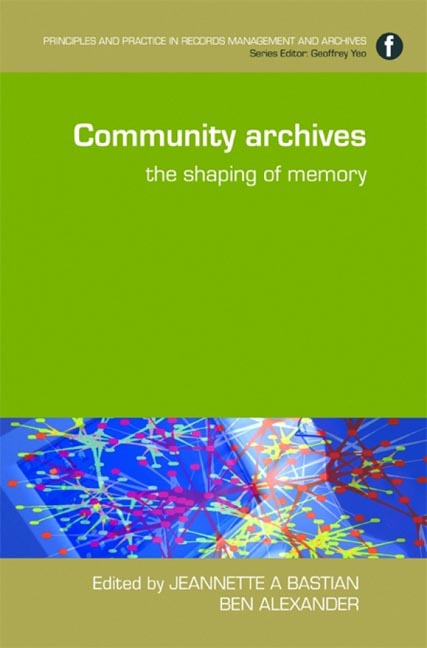Book contents
- Frontmatter
- Contents
- Introduction to the series
- Acknowledgements
- Contributors
- Introduction: Communities and archives – a symbiotic relationship
- Part 1 A community archives model
- 1 ‘It is noh mistri, wi mekin histri.’ Telling our own story: independent and community archives in the UK, challenging and subverting the mainstream
- 2 Special, local and about us: the development of community archives in Britain
- Part 2 Communities and non-traditional record keeping
- Part 3 Records loss, destruction and recovery
- Part 4 Online communities: how technology brings communities and their records together
- Part 5 Building a community archive
- Conclusion: The archivist and community
- Bibliography
- Index
- Miscellaneous Endmatter
- Miscellaneous Endmatter
- Miscellaneous Endmatter
2 - Special, local and about us: the development of community archives in Britain
from Part 1 - A community archives model
Published online by Cambridge University Press: 08 June 2018
- Frontmatter
- Contents
- Introduction to the series
- Acknowledgements
- Contributors
- Introduction: Communities and archives – a symbiotic relationship
- Part 1 A community archives model
- 1 ‘It is noh mistri, wi mekin histri.’ Telling our own story: independent and community archives in the UK, challenging and subverting the mainstream
- 2 Special, local and about us: the development of community archives in Britain
- Part 2 Communities and non-traditional record keeping
- Part 3 Records loss, destruction and recovery
- Part 4 Online communities: how technology brings communities and their records together
- Part 5 Building a community archive
- Conclusion: The archivist and community
- Bibliography
- Index
- Miscellaneous Endmatter
- Miscellaneous Endmatter
- Miscellaneous Endmatter
Summary
Introduction
Community archives in the UK encompass collecting activities that trace their roots back to the 19th century. At the same time, these archives have also been shaped by the ways in which the concept of community has been interpreted and applied by local and national governments as well as by a wide range of non-profit agencies. In some towns and counties, collecting at a local level predated the establishment of formal collections; in others, voluntary bodies helped form those institutions. In more remote areas, collecting began as a result of the distance from a local government collecting body's base, inadequacies in the policies or activities of those collecting bodies, or suspicions that the collecting body was not a suitable repository for holding particular kinds of source material. This article explores the growth of community archives and community collections in the UK through a range of voluntary bodies; the interactions among mainstream archives, libraries, and museums; and, as a result of those interactions, the creation of a body that seeks to act as a forum for community archives and all who are active in working for and with them.
The development of community collecting
Collecting records at a local level has a long history in England. Formal repositories in counties grew out of the need to house and preserve the court records from ‘quarter sessions’, which before 1888 constituted the local government of each county. It was not until 1926 that Bedfordshire, a county north of London, became the first record office in the country to take in records from corporate bodies and individuals to add to the historic official holdings. The creation of public libraries in the 19th century also provided stimulus for the preservation of local records, including what came to be defined as ephemera (posters, theatre programmes, sale catalogues) and photographs. Regional and local societies built up their own holdings while local voluntary activity contributed to the growth of formal record holding bodies.
In the town of Walthamstow, for example, a public library service was created in the 1890s, and the second borough librarian, G. E. Roebuck, acquired records of local institutions, title deeds and manorial records, which he housed in the library.
- Type
- Chapter
- Information
- Community ArchivesThe shaping of memory, pp. 29 - 46Publisher: FacetPrint publication year: 2009
- 3
- Cited by



